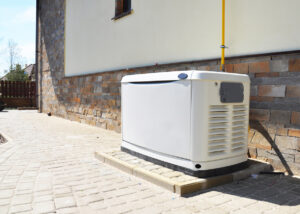Seymour’s #1 HVAC, Plumbing & Generator Provider

Need HVAC, plumbing, or generator repairs in Southern Indiana? Schedule an appointment or call our licensed experts at 812-372-8011 today.
Top-Rated HVAC
In Southern Indiana, it isn’t unusual to have your heater on in the morning, flip to air conditioning during the day, and turn it back on at night! Our crazy weather makes having a working HVAC system so important. Whether it’s your furnace or your AC unit, we’ll take care of all your HVAC repairs, replacements, and maintenance.
Heating
- Heating installation: New home? Upgrading? We’ve got your heating solutions. From furnace installation to geothermal heating, our team ensures perfect warmth.
- Heating repair: Whether it’s a furnace repair or heat pump repair, we ensure your heating units are back up and running in no time.
- Heating maintenance: From furnace maintenance to boiler tune-ups, we’ll keep your heating systems performing their best. Join the Comfort Club for even better maintenance deals!
Cooling
- Air conditioning installation: Stay cool with our top-tier air conditioning installation services. Whether it’s a traditional unit or a geothermal system, we got you covered.
- Air conditioning repair: From common hiccups to complex problems, our team is adept at air conditioning repair.
- Air conditioning maintenance: Regular air conditioning maintenance can prolong your unit’s life and save on energy bills. Let us help.
Professional Plumbing
A minor leak can cause immense water damage in a short amount of time, so it’s vital to call a plumber like Reliable Comfort right away. We provide plumbing services, like replacing a burst pipe or fixing a leaky faucet, which can be serious issues if ignored. We also repair gas lines and maintain your drains and pipes so that they flow smoothly.
Got a sump pump? We’ll help you keep it running so you don’t have to worry about a flooded basement. Or if you’re ready to improve your water quality and safety, we can install refreshing water filtration solutions in your home.
Generators
Ever experienced a sudden blackout and wished you were better prepared? With our whole-home standby generators, you won’t have to worry about unexpected power outages or rolling brownouts or blackouts. These generators seamlessly kick in, ensuring your home remains powered and your daily routine undisturbed. It’s not just about convenience; it’s about providing peace of mind for your family.
Considering a generator for your home? Contact Reliable Comfort at 812-372-8011 for a detailed consultation today.
Why Choose Reliable Comfort?
Here’s the simple truth: You’re not just getting a service with Reliable Comfort. You’re joining a family that cares. With our 100% satisfaction guarantee, your home’s comfort is in trusted hands.
Ready to upgrade your HVAC or plumbing system? Call the Reliable Comfort team at 812-372-8011 for a no-obligation consultation.
FAQ
What is the average life expectancy of equipment?
Most systems have a lifetime of 10 to 20 years. As your equipment gets older, its efficiency can decrease dramatically. You may notice that it gets noisier and needs repairs more often. When a unit begins to show it’s age, you have two choices. You can overhaul the system or replace it. Because heating and cooling technologies improve over time, a new system designed with newer, more energy-efficient equipment makes sense, especially if your system is 10 or more years old. We can estimate the cost of a new system as well as a payback schedule that will show you how newer technology will pay you back in lower energy usage.
Why should I purchase a service agreement?
Without warranty coverage, a breakdown can mean significant expense in parts, labor, or both. However, with one of our service agreements, you avoid that unexpected significant expense. While no warranty can guard against every possible problem, we can explain the broad range of protection our service agreements afford.
Why should I buy Energy Star labeled equipment?
The average home spends about $1,900 annually on energy bills. Heating and cooling accounts for as much as half of a home’s energy use. The EPA provides important recommendations for energy-efficient equipment, including proper sizing, quality installation and maintenance, and other home improvement considerations to help you get the most out of the heating and cooling products you purchase, save energy, and save as much as 20% annually on your total energy costs.
ENERGY STAR qualified products prevent greenhouse gas emissions by meeting strict energy efficiency guidelines set by the U.S. Environmental Protection Agency and the U.S. Department of Energy.
What does the Energy Factor (EF) on my water heater mean?
The water heater Energy Factor is a measure of the overall efficiency of the water heater. This is determined by comparing the energy in the heated water used daily to the total daily energy consumption of the water heater. The EF can be used to compare the energy efficiency of water heaters. Water heaters with higher EFs will have lower annual operating costs than comparable models with lower EFs. A higher EF signifies a more efficient model. Water heaters with high EF ratings may cost more initially, but save energy and money in the long run. Eventually, they will pay for themselves through a lifetime of energy savings.

